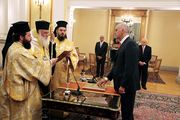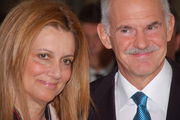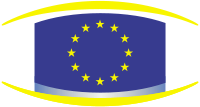George Papandreou
| Georgios A. Papandreou Γεώργιος A. Παπανδρέου MP |
|
.jpg) |
|
|
|
|
| Incumbent | |
| Assumed office 6 October 2009 |
|
| President | Karolos Papoulias |
|---|---|
| Deputy | Theodoros Pangalos |
| Preceded by | Kostas Karamanlis |
|
Leader of the Opposition
|
|
| In office 10 March 2004 – 6 October 2009 |
|
| Preceded by | Kostas Karamanlis |
| Succeeded by | Kostas Karamanlis |
|
President of the Panhellenic Socialist Movement
|
|
| Incumbent | |
| Assumed office 8 February 2004 |
|
| Preceded by | Kostas Simitis |
|
President of Socialist International
|
|
| Incumbent | |
| Assumed office 30 January 2006 |
|
| Preceded by | António Guterres |
|
Minister for Foreign Affairs and ex officio Head of State of Mount Athos
|
|
| In office 7 October 2009 – 7 September 2010 |
|
| Preceded by | Dora Bakoyannis |
| Succeeded by | Dimitris Droutsas |
| In office 18 February 1999 – 13 February 2004 |
|
| Preceded by | Theodoros Pangalos |
| Succeeded by | Tassos Yiannitsis |
|
Minister for National Education and Religious Affairs
|
|
| In office 8 July 1994 – 25 September 1996 |
|
| Preceded by | Dimitrios Fatouros |
| Succeeded by | Gerasimos Arsenis |
| In office 22 June 1988 – 2 July 1989 |
|
| Preceded by | Apostolos Kaklamanis |
| Succeeded by | Vasileios Kontogiannopoulos |
|
Member of the Hellenic Parliament
|
|
| Incumbent | |
| Assumed office 1981 |
|
|
|
|
| Born | 16 June 1952 Saint Paul, Minnesota United States |
| Nationality | Greek |
| Political party | Panhellenic Socialist Movement |
| Spouse(s) | Ada Papapanou |
| Children | Andreas (b. 1982) Margarita-Elena (b. 1990) |
| Alma mater | Amherst College Stockholm University London School of Economics Harvard University |
| Profession | Sociologist |
| Religion | Greek Orthodoxy |
| Website | www.papandreou.gr Panhellenic Socialist Movement Socialist International |
Georgios A. Papandreou (Greek: Γεώργιος Α. Παπανδρέου, [ʝeˈoɾʝios papanˈðɾeu];[1] born 16 June, 1952), commonly anglicized to George and shortened to Γιώργος (Giórgos, [ˈʝoɾɣos]) in Greek, is the current Prime Minister of Greece following his party's victory in the 2009 legislative election. His family comes from a long standing political dynasty. He previously served as Minister for National Education and Religious Affairs (1988-1989 and 1994-1996) and was Minister of Foreign Affairs from 1999 to 2004. Following his grandfather George Papandreou sr. and his father Andreas Papandreou, he is the third member of the Papandreou family to serve as the country's prime minister. Papandreou has been leader of the Panhellenic Socialist Movement (PASOK) party since February 2004. In 2006 he became President of the Socialist International. George Papandreou became the 182nd Prime Minister of Greece on October 6, 2009.
Contents |
Early life
He was born in Saint Paul, Minnesota, where his father, Andreas Papandreou, held a university post. His mother is American-born Margaret Papandreou, née Chant. He was educated at schools in Toronto, at Amherst College in Massachusetts, Stockholm University, the London School of Economics and Harvard University. He has a Bachelor of Arts degree in sociology from Amherst and a Μaster's degree in sociology from the LSE. He was a researcher in immigration issues at Stockholm University in 1972-73. He was also a Fellow of the Foreign Relations Center of Harvard University in 1992-93.
In 2002 he was awarded an Honorary Doctorate of Laws by Amherst College and in 2006 he was named Distinguished Professor in the Center for Hellenic Studies by Georgia State College of Arts and Science.
Papandreou's father studied and worked as professor of Economics from 1939 to 1959. His paternal grandfather, the elder George Papandreou, was three times Prime Minister of Greece.
The younger George Papandreou came to Greece after the restoration of Greek democracy in 1974. He then became active in his father's party, the Panhellenic Socialist Movement (PASOK). He joined the Central Committee of PASOK in 1984.
Papandreou was elected to the Greek Parliament in 1981, the year his father became Prime Minister, as MP for the constituency of Achaea. He became Under Secretary for Cultural Affairs in 1985, Minister of Education and Religious Affairs in 1988, Deputy Minister of Foreign Affairs in 1993, Minister for Education and Religious Affairs again in 1994, Deputy Minister of Foreign Affairs again in 1996 and Minister of Foreign Affairs in February 1999. He was also Minister Responsible for Government Coordination for the Bid for 2004 Olympic Games in 1997.
In his second term as Minister of Education, Papandreou was the first politician in Greece to introduce affirmative action, allocating 5% of university posts for the Muslim minority in Thrace. He was also instrumental in initiating the Open University in Greece.
Papandreou received numerous awards and honorary degrees in recognition of his work for human rights. As Foreign Minister he toned down the inflammatory nationalist rhetoric of his father and fostered closer relations with Turkey and Albania with which Greece had traditionally hostile relations. He worked tirelessly to solve the dispute over Cyprus; his efforts helped bring together the Annan Plan. Papandreou, like all other political leaders, was unwilling to make concessions on Greece's fundamental position that Cyprus must be reunited and accepted that this could not lead to a status quo ante of a normal unified state. However, the Republic of Cyprus entered the European Union and become a full member of the E.U. family in 2004. Papandreou also worked to resolve tensions regarding the Macedonia naming dispute.
Party leadership
In anticipation of the 2004 national elections in Greece, polls indicated that PASOK was very likely to lose as the conservative New Democracy party was heading towards a landslide. In January 2004, the incumbent PM Costas Simitis announced his resignation as leader of PASOK, and passed the leadership to Papandreou by recommending him as the new leader.
On February 8, 2004 PASOK introduced for the first time the procedure of open primaries for the election of party leadership. Even if Papandreou had no opponent, this was a move designed to solidify the open primaries, democratise the party, and make a clean break with a tradition of “dynastic politics.”
In December 2003 European Voice[2] in the publication "The Europeans of the Year" named him as "The Bridge-Builder" and "Diplomat of the Year".[3]. Le Monde has called him the "architect of Greek-Turkish rapprochement". He is a founding member of the Helsinki Citizens Assembly.
In May 2005, Papandreou was elected Vice President of the Socialist International following a proposal by the former President, António Guterres. In January 2006, Papandreou was unanimously elected President of the Socialist International.
In the 2007 general election, PASOK again lost to the incumbent New Democracy party of Kostas Karamanlis and Papandreou’s leadership was challenged by Evangelos Venizelos and Kostas Skandalidis. Papandreou, however, retained his party's leadership at a leadership election in November.
In June 2009 and under his leadership, his party won the 2009 European Parliament election in Greece.[4] Four months later, PASOK won the October 2009 general elections with 43.92 % of the popular vote to ND's 33.48 %, and 160 parliament seats to 91.[5]
Prime Minister

The inauguration of George Papandreou as the 182nd Prime Minister of Greece took place on October 6, 2009.[6][7]
Upon inauguration, Papandreou's government revealed that its finances were far worse than previous announcements, with a budget deficit of 12.7% of GDP, four times more than the eurozone's limit, and a public debt of $410 billion.[8] This announcement only served to worsen the severe crisis the Greek economy was undergoing, with an unemployment rate of 10%[9] and the country's debt rating being lowered to BBB+, the lowest in the eurozone[10]. Papandreou responded by promoting austerity measures[11], reducing spending, increasing taxes[12], freezing additional taxes and hiring and introducing measures aimed at combatting rampant tax evasion[13] and reducing the country's bloated public sector. The announced austerity program caused a wave of nationwide strikes[14] and has been criticised by both the EU and the eurozone nations' finance ministers as falling short of its goals[15].
Personal life

Apart from Greek and English, he is also fluent in Swedish, French, and Spanish.
Papandreou and his wife Ada have a daughter, Margarita-Elena. He also has a son, Andreas, (born 1982) from a previous marriage, 1976-1987, to Evanthia Zissimides, born in Cyprus and raised in England. He has two younger brothers, Nikos Papandreou and Andreas Papandreou, and two younger sisters, Sophia Papandreou and Emilia Nyblom.
Honours and decorations
- 1996: Commander of the Order of the Yaroslav the Wise (Ukraine)
- 1996: Grand Cross of the Order of the Lion (Finland)
- 1996: Grand Commander of the Order of the Polish Republic (Poland)
- 1998: Grand Cross of the Order of Civil Merit (Spain)
- 1999: Grand Cross of the Order of the Polar Star (Sweden)

- 1999: Grand Cross of the Order of the White Star (Estonia)
- 1999: Grand Cross of the Order of Honour, first class (Austria)
- 2000: Grand Cross of the Order of Merit, first class (Germany)

- 2001: Grand Cross of the Order of Isabella the Catholic (Spain)
- 2001: Grand Cross of the Order of the Crown (Belgium)

- 2002: Grand Cross of the Order of Infante dom Henrique (Portugal)
- 2002: Grand Cross of the Order of Pius IX (Vatican)

- 2003: Grand Commander of the Order of Merit (Hungary)
- 2003: Grand Cross of the Order of Merit (Italy)

- 2003: Gran Cruz El Sol du Peru (Peru)
Awards
- 1988: " Botsis's Foundation for the Promotion of Journalism " award for "his multifaceted struggles, which established the Free Radio as part of our democratic institutions"
- 1996: SOS against anti-Semitism, and affiliated organizations" Committee award, for his work against anti-Semitism
- 1997: Abdi Ipekci special award for Peace and Friendship ( June 1997) "for his activities in favor of Greek-Turkish approach during the period 1995-1996 while serving as Minister of National Education and Religion"
- 2000: Eastwest Institute 2000 Awards - Peace Building Awards . The 2000 "Statesman of the Year Award" given to Foreign Minister George Papandreou of Greece and Foreign Minister Ismail Cem of Turkey for their great efforts at improving relations between their respective countries
- 2002: Jackie Robinson Humanitarian Award (United States Sport Academy)
- 2003: Recipient: Defender of Democracy (Parliamentarians for Global Action)
- 2006: Open Fields Award (Truce Foundation USA)
- 2010: Quadriga Award (Werkstatt Deutschland, Germany), for The Power of Veracity (transparency regarding the state of the Greek economy)
See also
References
- ↑ "George Papandreou website". http://www.papandreou.gr/papandreou/content/Home.aspx?d=6&rd=7739474&f=-1&rf=-1&m=-1&rm=-1&l=1.
- ↑ http://www.european-voice.com/
- ↑ Papandreou
- ↑ "European election results 2009 for Greece". Results of the 2009 European Elections. Ministry of Internal Affairs. http://ekloges-prev.singularlogic.eu/e2009/pages/index.html?lang=en. Retrieved 2009-10-06.
- ↑ "Greek legislative election, 2009 results". Results of the 2009 Greek legislative elections. Ministry of Internal Affairs. http://ekloges.ypes.gr/pages/index.html?lang=en. Retrieved 2009-10-06.
- ↑ Mavrona, Katerina (2009-10-06). "New PM George Papandreou takes office". ANA-MPA (ana-mpa.gr). http://www.ana-mpa.gr/anaweb/user/showplain?maindoc=8022347&maindocimg=8022161&service=6. Retrieved 2009-10-06.
- ↑ "Papandreou sworn in as Greek PM". BBC News. 2009-10-06. http://news.bbc.co.uk/2/hi/europe/8292278.stm. Retrieved 2009-10-06.
- ↑ "Greece Bailout: France, Germany Angry Over Rescue". Time Magazine. 2010-02-16. http://www.time.com/time/world/article/0,8599,1964443,00.html. Retrieved 2010-02-17.
- ↑ "Greece's unemployment rate hits 10%". BBC News. 2010-02-11. http://news.bbc.co.uk/2/hi/business/8510386.stm. Retrieved 2010-02-17.
- ↑ "Greece's Debt and Economy Woes: As Bad as Dubai's?". Time Magazine. 2009-12-09. http://www.time.com/time/business/article/0,8599,1946594,00.html?iid=sphere-inline-sidebar. Retrieved 2010-02-17.
- ↑ "Greece unveils austerity programme to cut deficit". BBC News. 2010-02-03. http://news.bbc.co.uk/2/hi/europe/8494849.stm. Retrieved 2010-02-17.
- ↑ "Greek Tragedy: Athens' Financial Woes". Time Magazine. 2010-02-15. http://www.time.com/time/magazine/article/0,9171,1959059,00.html. Retrieved 2010-02-17.
- ↑ "No tax please, we're Greek". BBC News. 2010-02-11. http://news.bbc.co.uk/2/hi/programmes/from_our_own_correspondent/8509244.stm. Retrieved 2010-02-17.
- ↑ "Greece hit by nationwide strike over austerity measures". BBC News. 2010-02-10. http://news.bbc.co.uk/2/hi/europe/8507551.stm. Retrieved 2010-02-17.
- ↑ "Greece told to make more spending cuts". BBC Nwes. 2010-02-16. http://news.bbc.co.uk/2/hi/business/8517499.stm. Retrieved 2010-02-17.
External links
- Official site
- Personal blog
- Profile by Athens News-Macedonian Press Agency
- Acceptance speech at the Socialist International Conference (Athens 2006)
- Papandreou on Global Warming, Socialism and Democracy - video report by Democracy Now!
| Political offices | ||
|---|---|---|
| Preceded by Apostolos Kaklamanis |
Minister for National Education and Religious Affairs 1988–1989 |
Succeeded by Vasileios Kontogiannopoulos |
| Preceded by Dimitrios Fatouros |
Minister for National Education and Religious Affairs 1994–1996 |
Succeeded by Gerasimos Arsenis |
| Preceded by Theodoros Pangalos |
Minister for Foreign Affairs 1999–2004 |
Succeeded by Tassos Yiannitsis |
| Preceded by Kostas Karamanlis |
Prime Minister of Greece 2009–present |
|
| Preceded by Dora Bakoyannis |
Minister for Foreign Affairs 2009–2010 |
Succeeded by Dimitris Droutsas |
| Party political offices | ||
| Preceded by Costas Simitis |
President of the Panhellenic Socialist Movement 2004–present |
Incumbent |
| Diplomatic posts | ||
| Preceded by António Guterres |
President of Socialist International 2006–present |
Incumbent |
|
|||||||||||||||||||||||
|
|||||||||||||||
|
|||||||||||||||||

